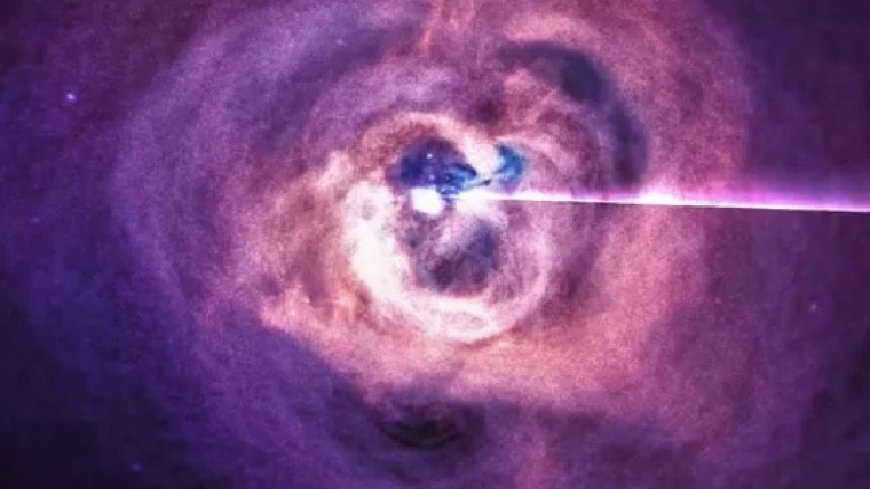The Eerie Sound of a Black Hole: NASA’s Chilling Audio Recording from Deep Space
NASA’s Chandra X-ray Observatory has recorded the sound of a black hole, revealing a deep cosmic hum from the Perseus galaxy cluster. Listen to this eerie discovery and learn what it means for space exploration.

Introduction: When the Universe Speaks
Space is often thought of as a vast, silent void, but recent discoveries by NASA challenge that notion. Thanks to the Chandra X-ray Observatory, scientists have captured the haunting sound of a black hole in the Perseus galaxy cluster—a deep, otherworldly noise that gives us a rare glimpse into the mysteries of the cosmos.
This discovery has taken the internet by storm, with NASA releasing an audio clip that translates deep-space pressure waves into an audible format for human ears. This eerie and mesmerizing sound challenges our perception of space and raises fascinating questions about the nature of black holes, cosmic waves, and the fabric of the universe itself.
How Did NASA Record the Sound of a Black Hole?
Black holes do not produce sound in the traditional sense because space is a vacuum, meaning there is no medium (like air or water) for sound waves to travel through. However, in dense galaxy clusters, like Perseus, gas and hot plasma provide a medium that allows pressure waves generated by the black hole to propagate.
The Chandra X-ray Observatory detected these pressure waves, which were then converted into sound waves through a process called sonification. This method takes astronomical data and maps it into audible frequencies, allowing us to hear the "voice" of a black hole for the first time.
? Further Reading: NASA’s Chandra X-ray Observatory and Sonification Process
What Does a Black Hole Sound Like?
The sound captured by NASA is deep, droning, and otherworldly, resembling an ominous cosmic hum. Scientists describe it as an ultra-low frequency wave that has been adjusted to make it audible to the human ear.
- Original Frequency: The sound waves from Perseus were initially at 57 octaves below middle C, making them impossible for humans to detect.
- Sonification Process: NASA scaled up the frequency by quadrillions of times to bring it within the range of human hearing.
- Final Result: A haunting, almost mechanical sound that has been described as "the voice of the void."
? Watch the video Here:
The sound of a black hole. Recorded by NASA's Chandra X-ray Observatory pic.twitter.com/lYViG549uL — Black Hole (@konstructivizm) March 7, 2025
Why Is This Discovery Important?
The recording of black hole sound waves is not just a scientific novelty—it has deep implications for our understanding of astrophysics and the fundamental nature of the universe.
1. Understanding the Role of Sound in Space
- This discovery proves that sound waves can travel through certain cosmic environments, such as the gas-filled regions of galaxy clusters.
- It helps scientists study how energy from black holes influences their surroundings, affecting star formation and galactic evolution.
2. Advancing Black Hole Research
- Black holes are among the most mysterious objects in the universe, and this study provides new insights into how they interact with their environment.
- The recorded pressure waves confirm that black holes can "sing" across billions of light-years, shaping entire galaxies through their energy emissions.
3. The Future of Space Sonification
- NASA’s use of sonification is opening up new ways to explore the universe, allowing scientists and the public to "hear" astronomical phenomena.
- Future missions could use this technology to map distant galaxies, detect gravitational waves, and even identify exoplanets by translating space signals into sound.
? Further Reading: How Sonification is Changing Space Exploration
How Black Holes Continue to Fascinate Us
Black holes have always captured the human imagination, inspiring countless books, movies, and scientific theories. From Einstein’s general relativity to modern astrophysics, our understanding of these cosmic giants has grown tremendously.
Some of the most groundbreaking discoveries in black hole research include:
- The First Image of a Black Hole (2019): The Event Horizon Telescope captured the shadow of a black hole in the Messier 87 galaxy.
- The Discovery of Supermassive Black Holes: Found at the center of most galaxies, including our own *Milky Way (Sagittarius A)**.
- Hawking Radiation Theory: Proposed by Stephen Hawking, suggesting that black holes can slowly evaporate over time.
? Further Reading: Stephen Hawking’s Black Hole Theories Explained
Final Thoughts: The Universe Like Never Before
NASA’s recording of a black hole’s sound is a remarkable step forward in our journey to understand the cosmos. This discovery challenges our assumptions about the "silence" of space and highlights the incredible power of modern science to make the unseen audible, visible, and understandable.
As we continue exploring the universe, what other secrets might the cosmos be hiding? One thing is certain—the sound of a black hole is just the beginning of many more awe-inspiring discoveries.
? Further Reading: NASA’s Latest Updates on Black Hole Discoveries
What's Your Reaction?
 Like
0
Like
0
 Dislike
0
Dislike
0
 Love
0
Love
0
 Funny
0
Funny
0
 Angry
0
Angry
0
 Sad
0
Sad
0
 Wow
0
Wow
0



















































